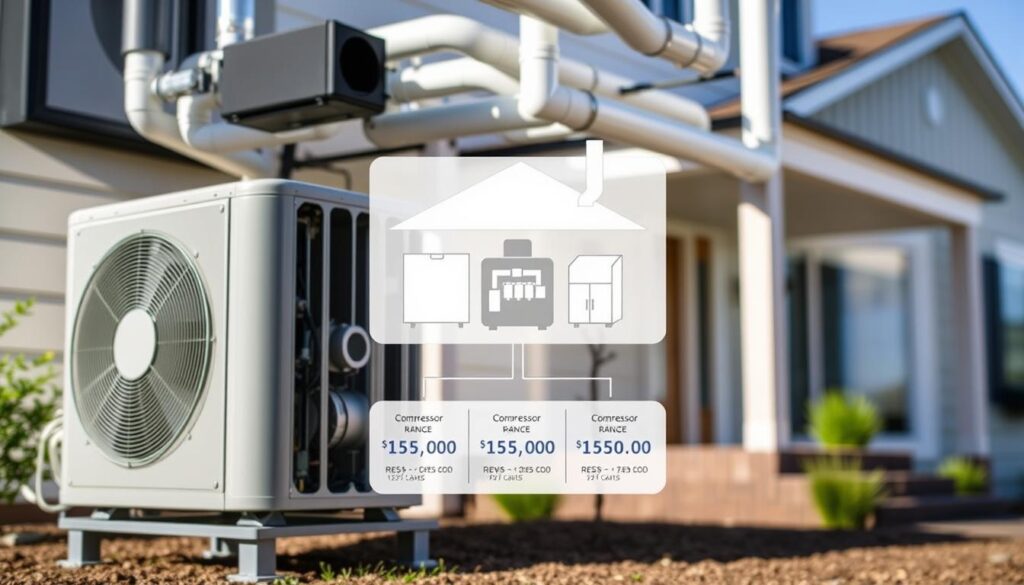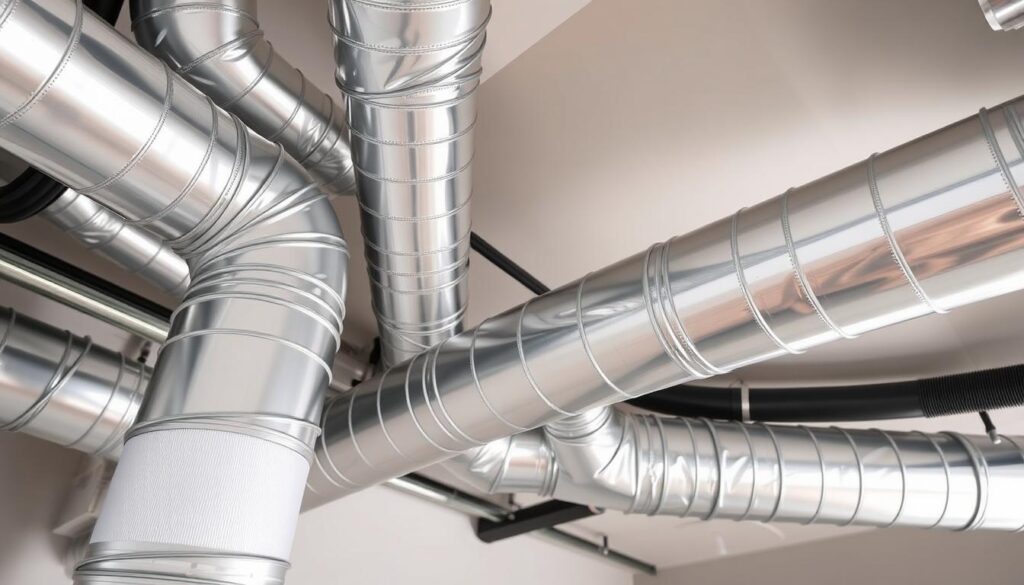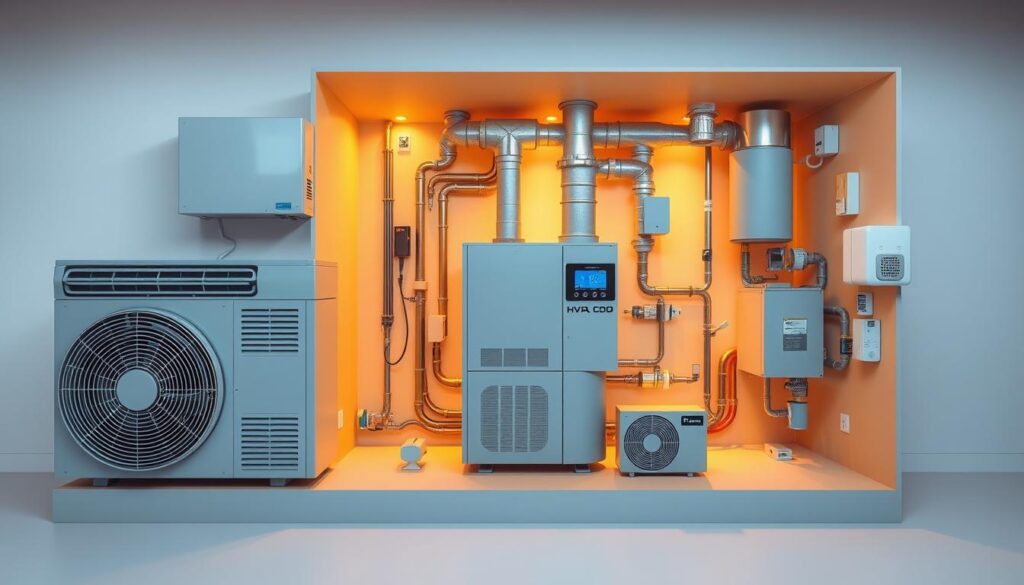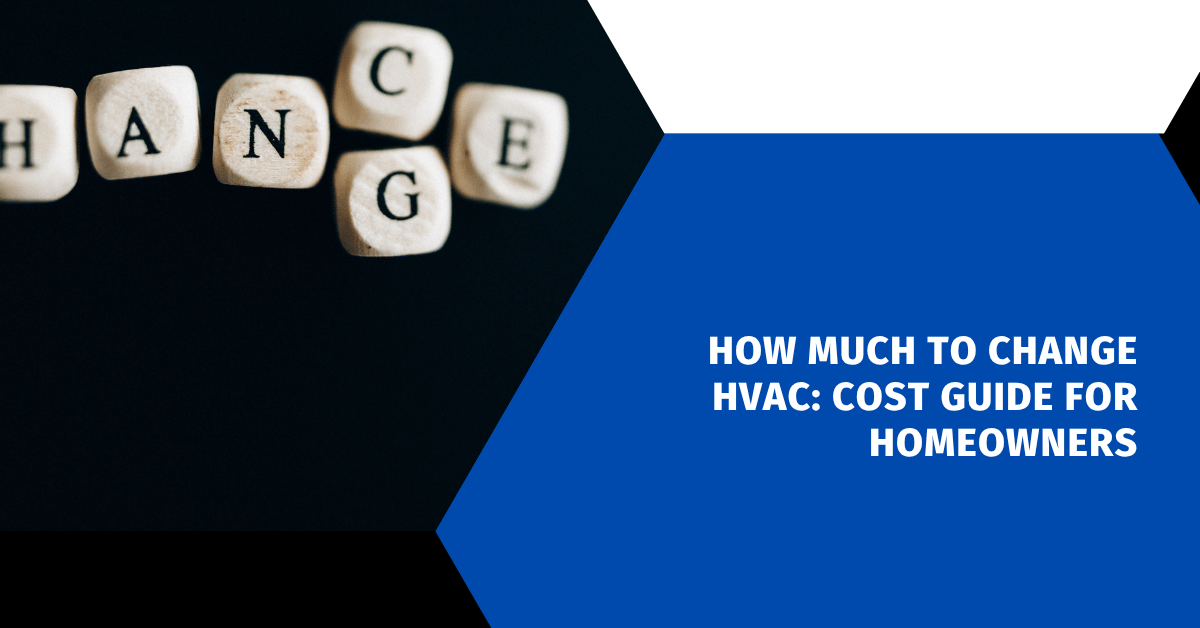Affiliate Disclosure
HVAC Guide Guys is a participant in the Amazon Services LLC Associates Program, an affiliate advertising program designed to provide a means for sites to earn advertising fees by advertising and linking to Amazon.
How Much to Change HVAC? Are you curious about the cost of a new HVAC system for your home? It’s a big decision that involves both technical and financial aspects. Understanding the cost can seem overwhelming.

Getting a new HVAC system is a big investment. Prices can go from $6,000 for a single unit to $15,000 for a full system upgrade. When deciding on a new HVAC, you’ll need to consider your home’s size, the type of system, and how energy-efficient it is.
This guide will help you understand the costs of replacing your HVAC system. We’ll cover everything you need to know. This way, you can make a choice that fits your budget and improves your home’s comfort and energy efficiency.
Key Takeaways
- HVAC replacement costs vary widely based on system type and home size
- Investing in an efficient system can lead to significant long-term energy savings
- Professional assessment is key for accurate cost estimation
- Energy efficiency ratings impact both upfront and ongoing costs
- Financing options and tax credits can help manage HVAC installation expenses
Table of Contents
Understanding HVAC System Basics and Components
Your home’s comfort depends on a well-functioning HVAC system. Knowing the basics of heating, ventilation, and air conditioning helps you make smart choices. This includes upgrading or replacing your HVAC unit.
HVAC systems are complex networks of equipment. They work hard to keep your home at the right temperature and air quality. This ensures your living space is comfortable all year round.
Different Types of HVAC Systems
Homeowners have many HVAC system options:
- Split Systems: Most common residential setup
- Packaged Units: Compact all-in-one solution
- Ductless Mini-Split Systems: Flexible zone cooling
- Geothermal Systems: Energy-efficient ground-source heating
Essential HVAC Components and Their Functions
| Component | Primary Function |
|---|---|
| Compressor | Circulates refrigerant and transfers heat |
| Condenser Coil | Releases heat from refrigerant to outside air |
| Evaporator Coil | Absorbs indoor heat and cools air |
| Air Handler | Circulates conditioned air through ductwork |
Lifespan of HVAC Systems
The average HVAC system lasts 10-15 years. Maintenance, usage, and environmental conditions affect its lifespan. Regular inspections by professionals can extend its life and prevent breakdowns.
Knowing when to replace your HVAC unit is key. Look for signs like high energy bills, frequent repairs, or uneven temperatures. These are signs it’s time for a new system.
Average HVAC Replacement Costs in 2024
When you’re planning to replace your HVAC, knowing the current prices is key. In 2024, the cost to replace your HVAC can range from $5,000 to $12,500. This price varies based on several important factors.
These factors include the type of system, the size of your home, and how complex the installation is.
Let’s look at the average costs for different HVAC systems:
- Central Air Conditioning Systems: $6,000 – $8,500
- Heat Pump Systems: $4,500 – $10,000
- Ductless Mini-Split Systems: $3,000 – $7,500
- Gas Furnace Replacements: $2,500 – $6,500
Prices can also change based on where you live. Coastal and extreme climate areas might cost more due to special equipment needs. Urban areas usually have better prices than rural ones.
Your exact costs will depend on a few key things:
- The size of your home
- The state of your ductwork
- The energy efficiency of the system
- The rates of local laborers
Pro tip: Always get quotes from certified HVAC pros to find the best deal.
Explore Our HVAC Shop
Looking for top-rated HVAC tools, parts, and accessories? Visit our shop and find the perfect solution for your needs.
Visit the ShopFactors That Influence HVAC Installation Costs
Knowing what affects hvac installation cost helps you plan better for your home’s comfort upgrade. Several important factors decide how much your new HVAC system will cost.
It’s not just the equipment price that matters. Many other things also play a big role in your home’s heating and cooling system cost.
Home Size and Layout Considerations
Your home’s size affects HVAC installation costs. Bigger homes need stronger systems, which can raise costs. Important factors include:
- Square footage of your home
- Ceiling height
- Number of rooms and floors
- Existing ductwork condition
Energy Efficiency Ratings Impact
Systems with higher efficiency might cost more upfront but save money over time. SEER ratings are key in setting both initial hvac installation cost and future energy bills.
- Higher SEER ratings mean better energy efficiency
- More efficient systems typically cost more initially
- Long-term energy savings can offset higher purchase prices
Installation Complexity and Location
Your location and home’s features can greatly change hvac costs. Climate, local building codes, and installation challenges all play a part in the total cost.
- Local climate requirements
- Accessibility of installation areas
- Complexity of ductwork modifications
- Regional labor rates
Pro tip: Always get multiple quotes and consider long-term efficiency when evaluating HVAC installation costs.
How Much to Change HVAC: Breaking Down the Expenses
Changing your HVAC system is more than just replacing the main unit. You’ll need to think about several important costs that can affect your budget.
The total cost of changing your HVAC system includes different parts:
- Equipment costs
- Labor installation
- Permit fees
- Additional system modifications
What you’ll pay depends on a few things. These are your home’s size, the state of your ductwork, and how hard the installation is.
| Expense Category | Average Cost Range |
|---|---|
| HVAC Unit | $3,000 – $8,000 |
| Labor Installation | $1,500 – $3,500 |
| Permit Fees | $250 – $500 |
| Ductwork Modifications | $500 – $3,000 |
Some homeowners might need extra work like electrical upgrades or better insulation. These extra projects can increase the cost of your HVAC replacement.
Pro tip: Always get multiple quotes and understand the full scope of work before committing to an HVAC system change.
Explore Our HVAC Shop
Looking for top-rated HVAC tools, parts, and accessories? Visit our shop and find the perfect solution for your needs.
Visit the ShopCost Comparison: Different HVAC System Types
Choosing the right HVAC system for your home is key. It affects both your upfront cost and ongoing energy bills. Your hvac system upgrade can make a big difference.
When looking at an hvac unit replacement, you’ll find many system types. Each has its own benefits and costs.
Central Air Systems
Central air systems are a top pick for cooling your whole home. They cost between $3,500 and $7,500 to install. This depends on your home’s size and setup.
- Ideal for larger homes
- Consistent temperature control
- Requires existing ductwork
Heat Pumps: Efficient Heating and Cooling
Heat pumps do both heating and cooling. They’re a great choice for a versatile upgrade. Prices are from $4,500 to $8,000 for standard models.
| Heat Pump Type | Average Cost | Energy Efficiency |
|---|---|---|
| Air-Source Heat Pump | $4,500 – $8,000 | High |
| Geothermal Heat Pump | $10,000 – $25,000 | Very High |
| Solar Heat Pump | $18,000 – $34,000 | Extremely High |
Ductless Mini-Split Systems
Ductless mini-split systems are great for homes without ducts or needing zone control. They cost between $2,000 and $14,500, based on zone count.
- No ductwork required
- Individual room temperature control
- Energy-efficient design
Hybrid System Considerations
Hybrid systems mix different heating and cooling tech. They offer a full upgrade strategy. Prices vary but usually fall between $6,000 and $12,000.
Your home’s needs, budget, and energy goals will guide your HVAC choice.
Ductwork Replacement and Modification Costs

Ductwork is key when you’re thinking about HVAC costs. It’s like your home’s air highway, spreading warmth and cool air everywhere.
Replacing ductwork can really add up. Contractors usually charge by the foot, about $15 on average. For a whole house, this can be a big bill.
- Standard residential ductwork replacement: $1,500 – $5,000
- Material costs vary by type:
- Flexible ducts: Most affordable
- Sheet metal ducts: Mid-range pricing
- Fiberglass duct board: Higher-end option
Several things can change how much ductwork costs:
- Home size
- How easy it is to get to the ductwork
- How complicated the installation is
- What local workers charge
Pro tip: Good ductwork means your HVAC works better and might save you money on energy in the long run.
Proper ductwork design ensures optimal air distribution and system performance.
Always talk to a pro HVAC tech to figure out what you need. They can give you a clear idea of the costs for your ductwork.
Energy Efficiency and Long-term Savings
When you think about upgrading your HVAC system, knowing about energy efficiency is key. Modern systems can cut down on your energy bills and make your home more comfortable.
Energy efficiency in HVAC systems is mainly measured by SEER (Seasonal Energy Efficiency Ratio) ratings. These ratings show how well your cooling system turns electricity into cooling power.
Decoding SEER Ratings
SEER ratings go from 13 to 26, with higher numbers meaning better efficiency. Here’s what you need to know:
- 13-15 SEER: Standard efficiency for older systems
- 16-20 SEER: High-efficiency models
- 21-26 SEER: Premium energy-saving systems
Annual Energy Cost Calculations
Choosing a high-efficiency HVAC system can save you a lot of money in the long run. A system with a higher SEER rating might cost more at first. But it can cut down your yearly energy bills a lot.
For instance, switching from a 13 SEER to a 20 SEER unit could save you 35% on cooling costs. These savings can pay off the cost of your HVAC upgrade over time.
Explore Our HVAC Shop
Looking for top-rated HVAC tools, parts, and accessories? Visit our shop and find the perfect solution for your needs.
Visit the ShopHVAC Brands and Their Price Ranges
When you’re looking to replace your HVAC unit, knowing the prices of different brands is key. The cost of a new HVAC system varies a lot between brands. Each brand has its own special features and value.
There are many top HVAC brands out there for homeowners to choose from. Let’s look at some of the most popular ones and what they cost:
- Carrier: Known for high-quality systems with prices ranging from $3,500 to $7,500
- Trane: Premium brand with advanced technology, typically costing between $4,000 and $8,000
- Lennox: Offers energy-efficient units with prices from $3,800 to $7,200
- Rheem: Budget-friendly option with solid performance, priced between $3,000 and $6,000
- York: Competitive pricing with units ranging from $3,200 to $6,500
Several things can affect the cost of a new HVAC system:
- Technological innovations
- Energy efficiency ratings
- Warranty coverage
- Brand reputation
| Brand | Price Range | Best For |
|---|---|---|
| Carrier | $3,500 – $7,500 | Comprehensive warranty |
| Trane | $4,000 – $8,000 | Advanced technology |
| Lennox | $3,800 – $7,200 | Energy efficiency |
| Rheem | $3,000 – $6,000 | Budget-conscious buyers |
| York | $3,200 – $6,500 | Balanced performance |
Pro tip: Always consider long-term efficiency and maintenance costs, not just the initial hvac unit replacement price.
Additional Components and Upgrades
When planning an hvac system upgrade, homeowners have many options. These can make your home more comfortable and efficient. You can add components that improve air quality and energy use.

Smart home technology has changed how we think about hvac costs and function. Modern upgrades offer big benefits. They go beyond just heating and cooling.
- Smart Thermostats: Intelligent temperature control
- Air Purification Systems: Advanced indoor air quality
- Dehumidifiers: Moisture control and comfort
- Zoning Systems: Customized temperature management
Each upgrade has its own benefits and costs. Knowing these options helps you make smart choices about your HVAC investment.
| Upgrade Component | Average Cost | Energy Savings |
|---|---|---|
| Smart Thermostat | $200-$500 | 10-15% annually |
| Air Purifier | $500-$1,500 | Improved air quality |
| Whole-Home Dehumidifier | $700-$1,300 | 5-10% cooling efficiency |
| Zoning System | $2,000-$3,500 | 20-30% energy reduction |
Choosing the right upgrades depends on your home’s needs, budget, and comfort goals. Consulting with an HVAC professional can help you get the most from your system.
Financing Options for HVAC Replacement
Replacing your HVAC system is a big deal. Knowing your financing options can make it easier to handle the costs. There are many ways to make paying for a new heating and cooling system more manageable.
Homeowners have several financing paths to explore when considering an HVAC system upgrade:
- Personal Loans
- Home Equity Loans
- HVAC Company Financing
- Credit Card Promotions
Loan Types and Payment Plans
Different loan options can help you manage the hvac replacement price more effectively:
| Loan Type | Interest Rate | Typical Term |
|---|---|---|
| Personal Loan | 6-36% | 1-7 years |
| Home Equity Loan | 3-12% | 5-30 years |
| HVAC Manufacturer Financing | 0-9.99% | 1-5 years |
Tax Credits and Rebates
Reduce your hvac expenses by exploring available financial incentives:
- Federal Energy Efficiency Tax Credits
- State-Level Rebate Programs
- Utility Company Incentives
- Energy Star Qualified System Rebates
Some programs offer up to $500-$2,000 in savings for energy-efficient HVAC installations. Check with local authorities and your utility provider for specific opportunities in your area.
Explore Our HVAC Shop
Looking for top-rated HVAC tools, parts, and accessories? Visit our shop and find the perfect solution for your needs.
Visit the ShopWays to Save on HVAC Installation
Lowering your HVAC installation cost is easier than you think. Smart homeowners can save a lot by using smart strategies.
Knowing the best time and preparation can cut costs without sacrificing quality. Here are ways to save on your HVAC system:
- Schedule installation during off-peak seasons (spring or fall)
- Get multiple quotes from certified HVAC professionals
- Consider energy-efficient models with possible tax credits
- Explore refurbished or slightly used equipment options
By negotiating and researching, you can greatly reduce your HVAC installation cost. Contractors often have seasonal discounts or package deals that can save you money.
| Savings Strategy | Potential Cost Reduction |
|---|---|
| Off-season Installation | 10-25% lower costs |
| Multiple Quote Comparison | 5-15% savings |
| Energy Efficiency Rebates | Up to $500 tax credits |
Pro tip: Regular maintenance can prevent expensive repairs and extend your new system’s lifespan, ultimately saving you money in the long run.
Always ask for detailed written estimates and ask lots of questions before signing any contracts. Clear communication helps avoid surprise costs when figuring out how much to change HVAC in your home.
Conclusion
Getting a new HVAC system needs careful planning and smart thinking. Your home’s comfort and energy use depend on picking the right system. This balance affects both the initial cost and long-term performance.
When looking at HVAC replacement, the cheapest option isn’t always best. Think about the system’s energy efficiency, maintenance costs, and performance. Getting it installed by certified pros can make a big difference in its reliability and costs.
Research and talking to experts are essential for HVAC investments. Get quotes from trusted HVAC contractors, check energy ratings, and look at financing options that fit your budget. This way, you’ll keep your home comfy and control costs effectively.
Your HVAC system is a big investment in your home. Focus on quality, efficiency, and expert advice to boost comfort and cut down on surprises. A good choice will last for years, saving you money on energy.

